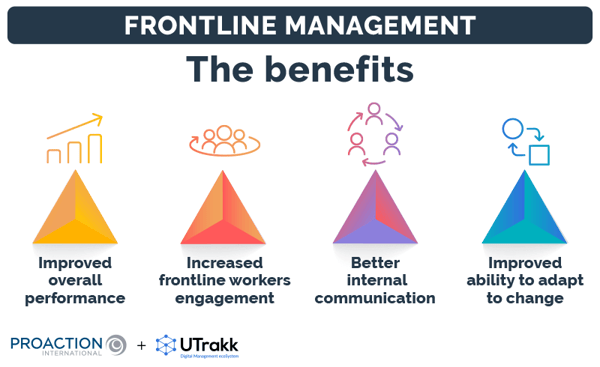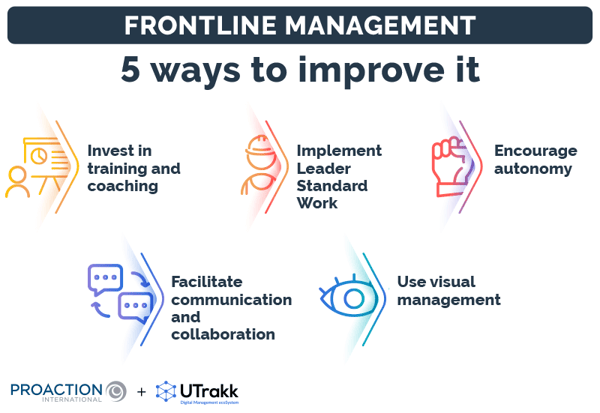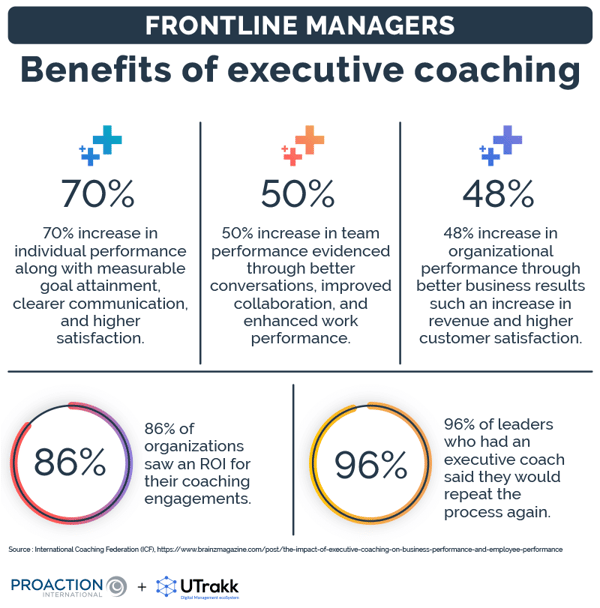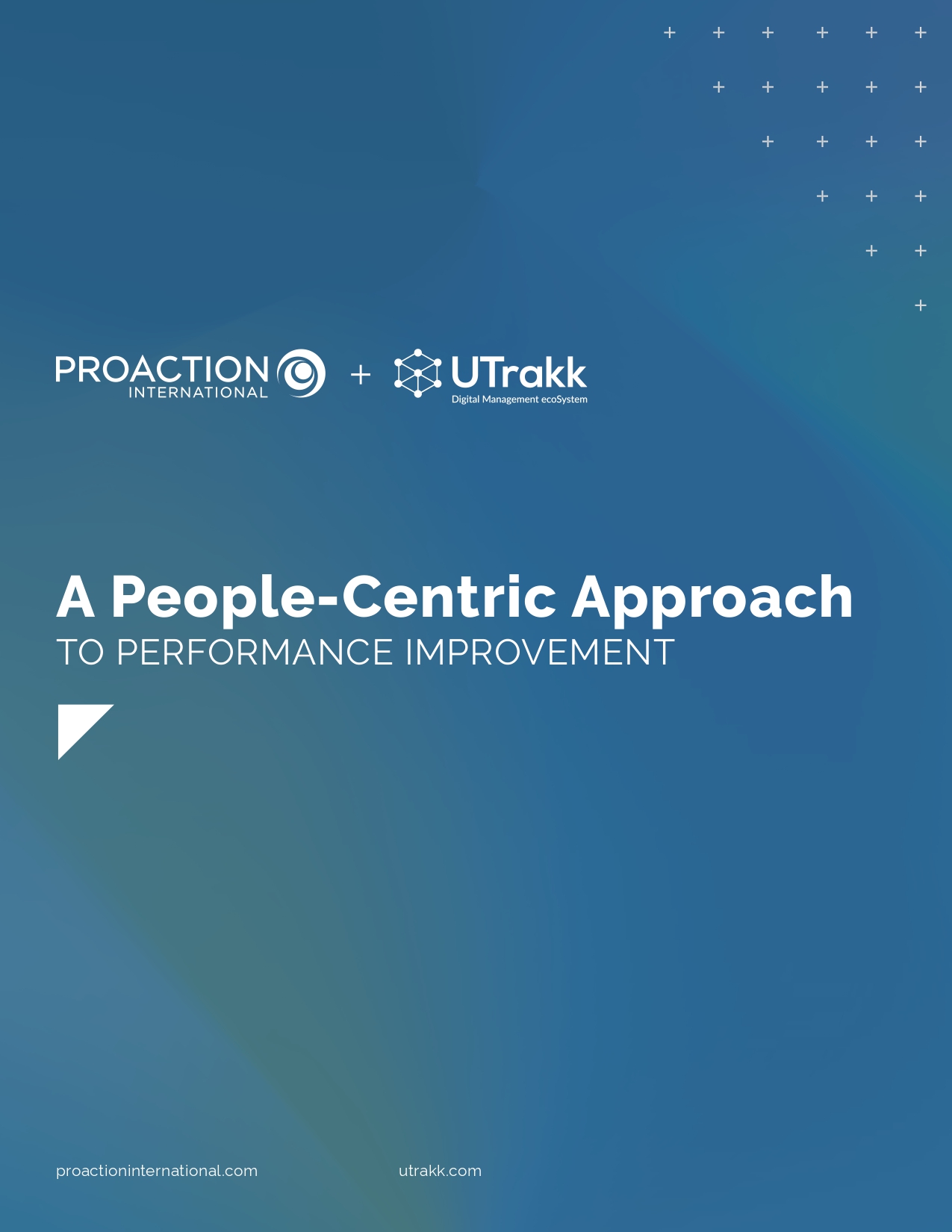Why should you equip and empower frontline managers?
Leadership isn't about being in charge; it's about taking care of those in your charge. - Simon Sinek
In a Harvard Business Review study, 77% of leaders agreed that frontline managers play a critical role in achieving organizational goals.
As leaders, you are vested in developing and effectively equipping frontline managers. By providing them with the appropriate resources, training, coaching, and tools, you ensure that your managers can lead their frontline teams to success.
Here are a few reasons why you should rethink your management policy and put it to work for frontline managers:

Improved overall performance
Well-equipped frontline managers are better prepared to manage operational issues and improve performance.
As an example, at Proaction International, we have seen a 10-15% improvement in performance ‒ even 25% in some cases ‒ due to leadership coaching and the use of the UTrakk platform:
- 26.6% increase in productivity at the PH Tech plant in Lévis, QC, Canada.
- 19% increase in productivity at St-Methode Bakery, QC, Canada.
Frontline workers engagement
Empowered frontline managers = empowered frontline employees.
Employee morale and job satisfaction are crucial to keep your employees. A motivated and engaged frontline workforce is a loyal workforce.
Well-equipped frontline managers can improve essential workers' quality of life and empower frontline employees by meeting their needs and creating a positive work environment. Doing so, they help retain the company's best talent, preventing labor shortage and reducing turnover.
According to a Workday study:
- 79% of frontline workers who feel a sense of belonging have no intention of leaving their employer.
- 80% of workers who say their manager understands and supports them regularly say they are happy in their job and have no intention of leaving.
Better internal communication
Frontline managers are important channels of communication between upper management and employees. They help to:
- Relay information in an accurate and timely manner.
- Convey the management's vision to employees.
- Raise issues from the floor to management.
Adapting to change
Well-equipped frontline managers can better manage transitions, crises, and corporate transformations.
How to improve frontline management
Billions of dollars are spent every year on manager development. Yet Gallup finds that only one in three managers agree that they have had the opportunity to learn and develop in the past year. - Gallup, It's the Manager
Managers, you have the power to optimize frontline management to make it a real competitive advantage for your organization!
Here are five actions you can take to equip your company’s frontline managers:

1. Invest in training and coaching
Managing frontline employees is a challenging task. Investing in training and coaching is one of the best ways to help your frontline leaders adopt the best management behaviors every day.
Training
Training frontline managers is essential to help them succeed in their role. There are several steps you can take to ensure you make the most of your training and coaching activities:
- Take stock of training needs, i.e., the skills frontline managers need to excel in their role (leadership, time management, communication, conflict resolution, etc.).
- Offer training programs tailored to each manager's individual needs.
- Encourage ongoing training through long-term development programs and participation in workshops, seminars, and online courses.
- Measure the impact of training by evaluating frontline managers' performance before and after the initiative. Use this data to adjust programs accordingly.
Coaching
Coaching is a significant asset that complements training and prepares your frontline leaders to tackle the complex challenges of their role. It offers personalized support to develop skills, achieve better performance, and create strong management practices.
The impact of coaching on ROI is significant in many industries:
- Heavy industry: 6:1
- Logistics and procurement: 4:1
- Manufacturing: 3.4:1
By making coaching a standard practice in your organization, you can create a culture of leadership development. Frontline managers can then become mentors and pass on the skills they have acquired by coaching their employees.
To make coaching effective:
- Identify each manager's needs to personalize the coaching approach (skill assessment, employee feedback, one-on-one discussions, etc.).
- Choose coaches with experience in frontline leadership development.
- Before starting coaching activities, establish clear, measurable objectives aligned with the manager's individual needs and the organization's overall goals.
- Offer ongoing support by setting up regular coaching sessions (monthly or quarterly, as required). This way, frontline leaders can work on their skills gradually and make adjustments along the way.
- Measure their progress using specific indicators based on the defined objectives to check that the coaching is effective.

2. Implement Leader Standard Work (LSW)
Leader standard work is a set of structured routines and practices that managers of all levels perform on a recurring and consistent basis.
Standardizing your frontline managers' day-to-day tasks and management practices will enable them to engage and empower teams, create a stable and productive workspace, and facilitate interactions between hierarchies in the company.
It's an excellent way of creating a more coherent, solid, and effective leadership.
3. Facilitate communication and collaboration
Dialogue and collaboration must be fluid through all levels of the organization ‒ employees, frontline managers, and management:
- Collaboration: Encourage sharing of information, ideas, experience, and best practices between departments.
- Clarity: Be clear with your managers about what you expect of them (role, responsibilities) and their teams (objectives) so that everyone is aligned.
- Active listening and nonviolent communication: Cultivate empathy, active listening, and nonviolent communication so managers and employees feel considered. Feel free to ask for their feedback via surveys or questionnaires.
- Honest feedback: Giving constructive feedback is an excellent way to help frontline managers improve and solve their teams' issues. Regular feedback can be provided through anonymous surveys and one-on-one meetings.
- Transparency: Encourage honest, open and transparent communication in conversations between you and your frontline managers, and between managers and employees. This builds trust through every level of the org chart and ensures alignment across the company.
4. Encourage autonomy
You need to be able to delegate, let your managers make decisions, and take total responsibility. It doesn't mean leaving them to fend for themselves but instead, giving them the space to play their part while providing them with the support and resources they need to achieve their goals:
- Allow your frontline managers to be creative and find solutions, and to express their opinions even if you disagree.
- Create trusted relationships with your managers. You need to be able to support and guide them when they need it.
According to Workplace, "80% of frontline workers believe the quality of their workplace technology will dictate their employee experience, and 52% said they would change jobs if they had access to better tools and technology."
- Give your managers the tools they need to be effective and productive, including technologies tailored to frontline managers and frontline employees (planning software, data analysis software, collaboration and communication platforms, specific hardware, etc.). For example, Proaction International's UTrakk daily management system is designed to support managers in every aspect of their daily work.
5. Use visual management
Visual management is a powerful tool for both top and frontline managers. It involves using intuitive visual elements (dashboards, charts, diagrams, maps, etc.) to organize and communicate critical information in the workplace ‒ at a glance. It can be used for all kinds of information but is especially popular for displaying performance charts, objectives, and standard practices.
Visual management is useful for:
- Sharing information
- Making complex data and processes easier to understand
- Defining and communicating work standards
- Identifying and solving problems
Visual management is an effective way to empower frontline employees, streamline task assignment, optimize processes, reduce waste, and improve inventory management.
Here are typical examples of visual management:
Dashboards and KPIs
Key performance indicators can include financial metrics such as sales profit margins and operational metrics such as inventory turnover, customer satisfaction, etc. Dashboards provide an instant view of company performance.
The 5S method
This Japanese Lean Manufacturing approach aims to optimize the work environment, eliminate waste, focus on value-added tasks, and maximize productivity.
The 5S method includes 5 stages that follow one another: Removing (Seiri), Locating (Seiton), Sparkling (Seiso), Standardizing (Seiketsu), and Tracking (Shitsuke).
Markings
Used in the majority of manufacturing organizations, markings are applied in various ways to different surfaces (floors, walls, machines, etc.).
For the frontline manager, these signals are a great help, as they facilitate the onboarding of new employees, keep the site clean, reduce accidents, and communicate critical information to their team (specific actions, location of an item, etc.).
Kanban
This visual signal or billboard is used to visualize who controls the flow of products in and out of the factory. The sign is placed in a visible area and indicates, with Kanban cards, when stock needs to be replenished.
Investing in your frontline leaders means investing in your company's success
If you give every member of your company's team a great manager ‒ a great coach ‒ who cares about their development and growth, you've succeeded in building an organization of unlimited potential. - Gallup, It's the Manager
Frontline managers form an indispensable bridge between strategic vision and operational implementation, between executive leaders and many frontline employees. They directly impact employee engagement and productivity, helping to create a positive and effective work environment. Their strength influences all levels of the organization and contributes to its long-term success.
As leaders, equipping your frontline managers and investing in their development should be a priority. It will allow you to capitalize on your people’s skills and talents, creating a high-performing workforce. It will allow you to create a sustainable organizational and leadership culture, where strategic goals are aligned and employees are motivated to reach them.
This endeavor is much more than a resolution; it's a partnership between you and your frontline managers, a strong commitment to effectively solving challenges and ensuring continued growth.
FAQ on empowering frontline managers








